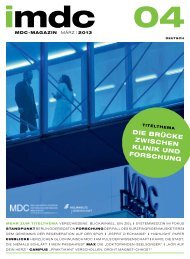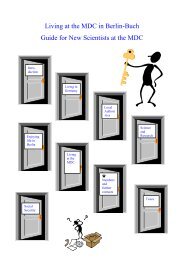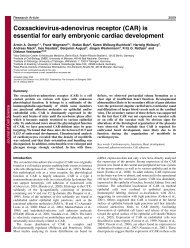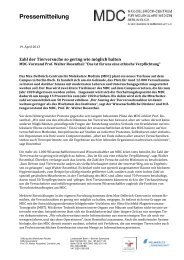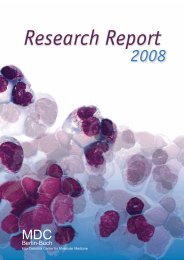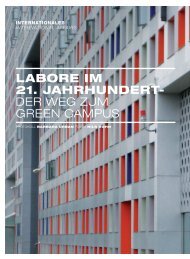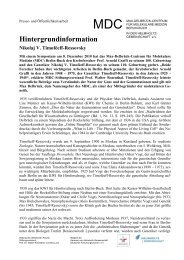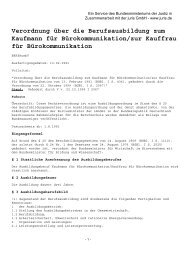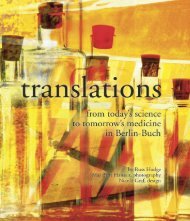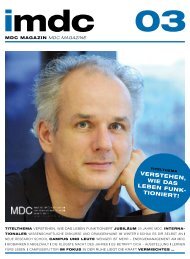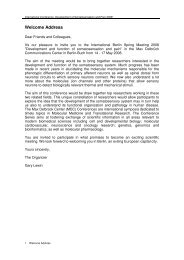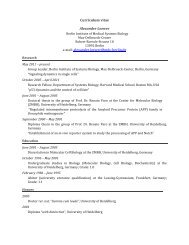iMDC03 zum Download (pdf)
iMDC03 zum Download (pdf)
iMDC03 zum Download (pdf)
Sie wollen auch ein ePaper? Erhöhen Sie die Reichweite Ihrer Titel.
YUMPU macht aus Druck-PDFs automatisch weboptimierte ePaper, die Google liebt.
Campus and People<br />
Learning for Life<br />
Text Christine Minkewitz, Barbara Urban<br />
tran s lation Carol Oberschmidt Photos Gläsernes LAbor<br />
In January 2012 the Life<br />
Science Learning Lab<br />
“Gläsernes Labor” conducted<br />
a new experiment:<br />
Ten ninth graders took<br />
part in a compact internship<br />
of up to three weeks<br />
to experience first-hand<br />
what it is like to work in<br />
science professions. This<br />
project was supported by<br />
the Freundeskreis of the<br />
MDC Berlin-Buch.<br />
Each year around thirty high school<br />
students do a student internship in the<br />
Life Science Learning Lab. There they<br />
become acquainted with work in the<br />
different labs –- the GenLab, MaxLab<br />
and the ChemLab – and assist in<br />
courses that are led by scientists from<br />
the research institutions on campus.<br />
A special internship in January 2012<br />
offered an entirely new format: Ten<br />
young people from Berlin high schools,<br />
including Robert Havemann High<br />
School, Konrad Duden High School and<br />
Ernst Reuter High School were given<br />
the opportunity to try out what other<br />
aspects a lab internship can offer.<br />
“The basic idea of the student<br />
internship is to be able to get acquainted<br />
with professional fields while still<br />
a high school student,” said Helga<br />
Fenz, director of the science division at<br />
Robert Havemann High School, partner<br />
school of the Life Science Learning<br />
Lab. “An internship can increase a<br />
student’s desire to choose a particular<br />
profession, but it can also raise doubts<br />
and lead to a different career choice.<br />
For students with scientific ambitions,<br />
the offer of the Life Science Learning<br />
Lab is a unique opportunity, because<br />
research means much more than just<br />
carrying out experiments. The young<br />
people take the new experiences they<br />
have made here back to their schools<br />
and report about this in presentations<br />
to their teachers and classmates.”<br />
Besides learning about theory and<br />
performing experiments on “Genetics”,<br />
“Polymerase Chain Reactions” and<br />
“Protein Isolation”, the students<br />
carried out research on specific topics.<br />
“The methods of scientific research<br />
also have to be learned. An Internet<br />
search doesn’t just mean looking up<br />
something in Wikipedia,” said Ulrike<br />
Mittmann, staff member in the Life<br />
Science Learning Lab. The young people<br />
can benefit from all of these skills. This<br />
view is shared by Nicolas Reschke (14),<br />
a student from Konrad Duden High<br />
School. He used the student internship<br />
to focus on biological and chemical<br />
questions in more detail. When he<br />
visited the MaxLab with his class in<br />
June 2011, he was welcomed as the<br />
hundred thousandth student to visit<br />
the Life Science Learning Lab, which<br />
has been in operation since 1999. Now<br />
he is delighted to have received one of<br />
the coveted internship places. “I think<br />
that in a research group with normal<br />
laboratory work, such intensive guidance<br />
and supervision like we receive<br />
in the student internship would not<br />
be possible,” he said. “The internship<br />
76 imdc03 2012



